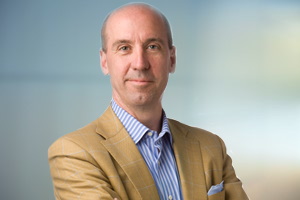Nice guys finish last.
Leo Durocher, the Chicago Cubs baseball manager known for injuring opponents and cheating at cards, coined this memorable motto in the 1960s. Yet under the leadership of “Leo the Lip,” the Cubs failed to win a single National League pennant. In his case, nasty guys finished far behind.
For futurist and best-selling author Jack Uldrich, Durocher embodies a “win at all costs” mentality that does not lead to success. In his book, The Great Reset: The Emerging Age of Imagination, Renewal and Reconnection, Uldrich argues that rules of business were being quietly reimagined long before a once-in-a-century pandemic. He presented before RGA clients on this “great reset” and recently sat down with RGA staff to answer questions about how an extraordinary group of individuals, enterprises, and organizations are reforming long-held assumptions about business, reinventing products and processes, and reimagining ways to engage with the world.
Q: Recently, a New York Times review of a range of corporate earnings calls from 2020 showed that the most popular term executives used was “unprecedented.” And yet you argue that our lives were being reshaped by forces with many precedents long before the current global pandemic. Can you explain?
An evolution had already been taking place for some time, with profound but not always obvious implications for business, communities, and the planet. I would argue that the events of 2020 just accelerated trends that were already with us, from the growth of cashless payments to telemedicine to remote working to online education. The shock of the pandemic just made these shifts more visible and therefore impossible to ignore. A tiny virus brought society to its knees, while forcing us to pay attention to our interconnectedness.
Q: Define this great reset.
Business models are changing because human perceptions are changing. The pandemic forced many businesses to recognize other views, other visions, other realities – and to invite different voices to the table to help solve problems. And what we’ve recognized is that there are innovators and thinkers out there who have been reimaging modes of life and commerce for a while now. I saw a meme recently that read: “Normal was the crisis.” In other words, the way that we were operating before the pandemic and economic downturn wasn't necessarily that sustainable.
We’ve seen business leaders respond to this by increasingly acknowledging an obligation to balance the need to make a profit against an obligation to customers, the community, and the planet.
Q: We’ve seen corporate social responsibility pledges before. What makes this different?
This goes beyond words; we’re seeing actions. Large financial institutions are beginning to withdraw funds and actively remove both directors and potentially CEOs who are perceived to be ignoring their responsibilities to the community. Kate Raworth, an Oxford University professor, has written an astounding book called Donut Economics that really captures this. Raworth’s premise is that, for the last 200 years, there has been an unquestioned assumption among all economists that economic growth is an unmitigated good: the bigger the economy, the better.
She says in response: “Unlimited growth is the ideology of the cancer cell.” There is no reason to think any modern economy can expand indefinitely, consuming more and more resources, without consequences. She calls for a fundamentally different type of more deliberative economic growth – one that seeks to balance sustainability and human rights against efficiency and productivity. The economy can be likened to a donut. At center, an empty space opens, a hole in the donut, when institutions fail to meet the basic needs of humanity: food, access to clean water, affordable housing, health care, living wages. At the same time, when economic growth widens beyond the circle, business activities can overtax the planet in powerful ways, accelerating climate change and reducing quality of life. We must figure out how to pull populations out of grinding poverty without doing excessive damage to our natural environment.
Q: So is growth no longer the goal? And how does this affect insurers?
It’s not that growth is bad; it’s that balance is good. In many ways this reset involves a return to the long-term focus and investment in the future that is at the core of the promise of insurance. There’s a Greek quote that is almost 2,500 years old: “A society grows great when old men and women plant trees, yet never expect to enjoy their shade.” The only reason we're here today is because of prudent actions from past generations. If we are to thrive in the years ahead, we're going to have to think beyond satisfying immediate needs and plan to meet the needs of the generations to follow. And that takes an act of imagination and the capacity to consider many possible approaches. The insurer’s business model is literally founded on drawing lessons from the experience of the past to mitigate the risks of the future. Insurers have an essential role to play in this transformation.
Q: Has the transformation begun?
We are already seeing this shift play out with the rise of the public benefit, or B, corporation. Up until a few years ago, U.S. publicly traded companies had a fiduciary responsibility to focus only on making profits regardless of the consequences to communities and the planet. Now due to changes in the laws of 35 U.S. states, it is entirely legal for companies to move from focusing solely on profit to emphasizing other societal goals by incorporating as B corporations. The number of companies doing so has risen from fewer than two dozen in 2007 to over 3,000 today. Many are thriving enterprises in financial services and public health as well as in retailing or consumer products.
Think about the startup insurer Lemonade. They’re known as a disruptor for leveraging artificial intelligence and big data; what is perhaps less appreciated is that they are a public benefit corporation. This trend extends to peer-to-peer insurance networks and to blockchain technology, the distributed ledger, which relies on automatic reconciliations among large, interconnected networks of individuals. These innovations rest on the rejection of zero-sum competition, in which there are only winners and losers. There is a dawning recognition that all of us are interdependent and that it is possible for a business and the larger society to win together.
Q: You mention this need for reframing – this shift in perspective. Could you talk for a moment about that?
I think in many ways the disruptions of 2020 forced us to embrace paradox, and one of the most powerful paradoxes I can think of is that, if you want to live your best, your truest life, you have to think about your death. A pandemic has a way of making the possibility of death seem a lot more present and to cause us to consider the things that matter most. The political and cultural commentator David Brooks refers to a distinction between resume virtues and eulogy virtues. For too long, too many of us have been focused on these resume virtues: How do I become successful? How do I get that next degree? How do I get that next promotion? But what about empathy, self-sacrifice, compassion, the ability to cultivate friends or build a family? These are not qualifications that you might cite on a resume, but they are virtues that we’d want to be remembered for after death, in eulogies. In a data-based, results-driven corporate environment, character and societal contributions can be incredibly difficult to measure, but these factors will drive the businesses of the future.
Q: You just mentioned that this is difficult to measure, so how can these ideas even translate to the business world?
It takes an exercise in reframing. There is a Japanese character for a word called Kokoro. And in the Japanese language, Kokoro actually means mind, heart, and spirit. In the West, we have distinct and separate words for these three concepts. In the Japanese language, there is no separation, and business leaders can explore these concepts interchangeably. I would argue that this is a gift, that words, in this case, really matter, and that business leaders need to find language to express these concepts to employees, to shareholders and to competitors. I’ll give you an example: Harvard Medical School once emphasized its global expertise in treating disease in its mission statement; now the school describes itself as a community-based organization promoting wellness. The focus is shifting away from individual excellence to community impact. What better way to sum up the project of insurance than to say your job is to protect future generations? We need to find ways to recognize and celebrate this.
Q: All of this sounds pretty daunting.
Many ideas that seem to be on the fringe today may transform our world tomorrow, but it’s important to recognize that these concepts are not new – they’re already with us today. Think about this analogy: Within every caterpillar there are imaginal cells that essentially help a caterpillar dissolve into itself and reform into a butterfly. Nothing goes away, but an ugly, sluggish, crawling insect suddenly becomes a beautiful flying creature. All of the components were always there. They are just reformed. We have an opportunity to reframe today’s problems into new opportunities; to reconnect with employees and customers on a deeper, more meaningful level; to re-envision our relationship to society and the environment; and to reimagine a better, bolder and more beautiful world.



